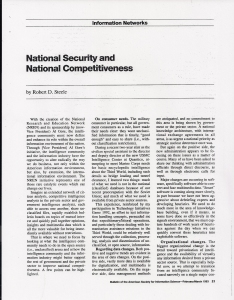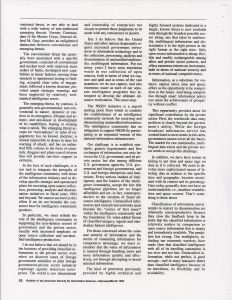

PDF (2 Pages): National Security and National Competitiveness
Full Text Below the Fold
National Security and National Competitiveness
by Robert D. Steele
Bulletin of American Society of Information Science (Feburary/March 1993)
With the creation of the National Research and Education Network (NREN) and its sponsorship by (now- Vice President) Al Gore, the intelli-gence community must now define and enhance its role within the overall information environment of the nation. Through [Vice President] Al Gore’s initiative, the intelligence community and the information industry have the opportunity to alter radically the way we do business, not only within the American information environment, but also, by extension, the interna-tional information environment. The NREN initiative represents one of those rare catalytic events which can change our lives.
Imagine an extended network of cit¬izen analysts, competitive intelligence analysts in the private sector and gov¬ernment intelligence analysts, each able to access one another, share un¬classified files, rapidly establish bul¬letin boards on topics of mutual inter¬est and quickly pull together opinions, insights and multimedia data which is all the more valuable for being imme¬diately available without restrictions.
That is where we need to focus by looking at what the intelligence com-munity needs to do in the open source (i.e., unclassified) arena and at how the intelligence community and the infor-mation industry might better support the rest of government and the private sector to improve national competi-tiveness. A few points can be high-lighted.
On consumer needs. The military consumer in particular, but all govern-ment consumers as a rule, have made their needs clear: they want unclassified information that is timely, “good enough” and easy to share (i.e., with¬out classification restrictions).
During a recent two-year stint as the civilian special assistant to the director and deputy director at the new USMC Intelligence Center at Quantico, at-tempting to meet Marine Corps needs for basic encyclopedic intelligence about the Third World, including such details as bridge loading and tunnel clearance, I learned two things: much of what we need is not in the national (classified) databases because of our recent preoccupation with the Soviet Union; and much of what we need is available from private sector sources.
This experience, reinforced by my participation in Technology Initiatives Game 1992, an effort to test informa-tion handling concepts, persuaded me that expeditionary/littoral operations, and particularly those dealing with hu-manitarian assistance missions to the Third World, could be relatively well served through the collection, process¬ing, analysis and dissemination of un¬classified, or open source, information.
Regarding data changes. Both pos¬itive and negative trends are evident in the area of data changes. On the posi¬tive side, vastly more data is available for digitalization, and multimedia is electronically available. On the nega¬tive side, data management methods are antiquated, and no commitment to this area is being shown by govern¬ment or the private sector. A national knowledge architecture, with interna¬tional exchange agreements in all areas, is as urgent a national priority as strategic nuclear deterrence once was.
But again on the positive side, the new administration appears to be fo-cusing on these issues as a matter of course. Many of us have been asked to share our thinking with administration officials through direct discourse, as well as through electronic calls for input.
Major changes are occurring in soft¬ware, specifically software able to con¬vert and fuse multimedia data. “Smart” software is coming along more slowly, in part because we have not been ag¬gressive about debriefing experts and developing heuristics. We need to do much more in the area of knowledge¬base building, even if it means, as some have done so effectively in the signals environment, that we must cap¬ture hundreds of work years of heuris¬tics against the day when we can quickly convert these heuristics into exploitable software.
Organizational changes. The biggest organizational change is the trend toward privatization of intelli-gence and the availability of virtually any information desired from a private sector source. That is especially help-ful now, as we attempt to transition from an intelligence community fo-cused narrowly on a single major con-ventional threat, to one able to deal with a wide variety of non-traditional emerging threats. Former Comman¬dant of the Marine Corps, General Al¬fred M. Gray, provides an enlightened distinction between conventional and emerging threats.
The conventional threat has gener-ally been associated with a specific government; consisted of conventional and nuclear tools with relatively static orders of battle; developed new capa-bilities in linear fashion, moving from research to operational testing to field¬ing; accepted clear rules of engage¬ment; followed a known doctrine; pro¬vided ample strategic warning; and been supported by relatively well- marked intelligence assets.
The emerging threat, by contrast, is generally non-governmental; non-con-ventional in nature; dynamic or ran-dom in its emergence, lifespan and ac-tions; and non-linear in development of its Capabilities, buying or stealing what it needs. The emerging threat ac-cepts no “conventions” or rules of en-gagement; has no known doctrine; is almost impossible to detect in time for warning of attack; and has an unlim¬ited fifth column in the form of crimi¬nals, druggies and plain scared citizens that will provide one-time support in extremis.
In the face of such challenges, it is our task to integrate the strengths of the intelligence community with those of the information industry and to de-velop specific strategic and operational plans for executing open source collec¬tion, processing, analysis and dissemi¬nation initiatives in fiscal years 1994 and beyond. We cannot succeed in this effort if we do not broaden the con¬sumer base for intelligence community products.
In particular, we must rethink the role of the intelligence community in supporting the non-defense sectors of government and the private sector, usually with increased emphasis on open source collection and unclassi-fied intelligence production.
I do not believe that we should be in the business of providing classified in¬formation to the private sector, even when we discover cases of foreign government subsidies or joint foreign government-private sector industrial espionage against American enter-prises. The world is too international and ownership of enterprises too cloudy to permit those judgments to be made with any consistency or justice.
But I do believe that the United States and other nations desperately re¬quire increased government invest-ment in information technology and in the collection, processing, analysis and dissemination of unclassified multime¬dia, multilingual information. For too many years I have seen enormous waste in our collection of open sources, both in terms of what we cap¬ture and spill and in terms of the vast quantities we do not capture, and also enormous waste as each of our sepa¬rate intelligence programs has at-tempted to develop the ultimate all-source workstation. This must stop.
The NREN initiative is a superb starting point from which to consider the establishment of an intelligence community network for receiving and disseminating unclassified information. The intelligence community has an obligation to support NREN by partici¬pating in an expanded version of this national information infrastructure.
Our challenge is to establish stan-dards, generic requirements and free exchanges of information, not only be¬tween the U.S. government and its pri¬vate sector, but also among different U.S. government agencies, U.S. gov-ernment and foreign governments, and U.S. and foreign enterprises and insti-tutions. Every serious student of intel-ligence, and the leaders of the intelli-gence community, accept the fact that intelligence pipelines are no longer affordable and are, in fact, counterpro¬ductive to the creation of fused all¬source intelligence. Unclassified infor¬mation and unrestricted networks must become the “source of first resort” within the intelligence community and the foundation for value-added fusion of classified imagery, signals and clan-destine human intelligence.
For those concerned about the value and security of information and the merits of concealing information for competitive advantage, we must re¬member that the value of information is insured through handling more and more information quickly and effec-tively, not through attempting to hoard selected information.
The kind of protection previously provided by highly technical and highly focused systems dedicated to a single, known threat is now available only through the broadest possible sen¬sor string, one that takes in multime¬dia, multilingual information and dis¬seminates it to the right person in the right format at the right time. Only open source information is cheap, flex¬ible and readily exchangeable among allies and private sector partners, and offers enormous returns on investment, both in terms of national security and in terms of national competitiveness.
Information, as a substitute for vio-lence, capital, labor, time and space, offers us the opportunity to be compet¬itive in the future. And being competi¬tive through smart information policy can mean the achievement of prosper¬ity without conflict.
This opportunity provides areas for significant contribution by the private sector. First, the worldwide data entry problem is clearly beyond the govern-ment’s ability. While the foreign broadcast information service has worked hard to meet needs in this area, government cannot cover all the bases. The market for raw multimedia, multi-lingual data exists and the private sec-tor needs to accept this challenge.
In addition, we have been remiss in failing to put time and space tags on data as it is collected. We need to de-velop more sophisticated means of la-beling data in relation to the specific time and geographic location associ-ated with its content and its genealogy. Data today generally does not have an understandable, i.e., machine-readable, time and space context. That’s some¬thing to think about.
Classification of information and at¬tempts to restrict its dissemination are inherently counterproductive because they slow the feedback loop to the point that the classified information is relatively useless in comparison to open source information that is timely and immediately available. The pendu¬lum has swung. Our warfighters, in¬cluding our economic warriors, have made clear that classified intelligence with all of its handling constraints is too slow and too late. Unclassified in-formation, while not perfect, is good enough—and in many instances better than classified intelligence because of its timeliness, its flexibility and its availability.



